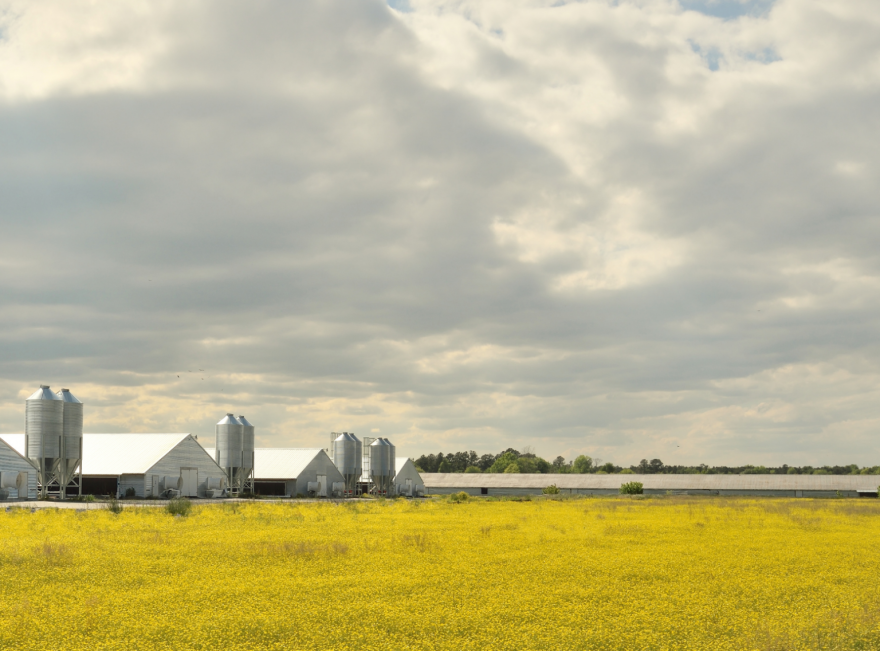A proposed biogas facility in Seaford remains controversial, stirring vocal opposition from local community and environmental activists lobbying to stop the Delaware Department of Natural Resources and Environmental Control from issuing a permit for the project.
A Wednesday night workshop held by DNREC to discuss the facility created a flashpoint for those tensions.
Bioenergy DevCo — the Maryland-based company planning to build the biogas facility — already owns the site, which has serves as a composting facility from poultry waste from nearby Perdue processing facilities, along with poultry farms operated by Perdue's contract growers.
Bioenergy DevCo plans to add a digester, which would use anaerobic fermentation to extract methane from poultry waste to sell as natural gas. The gas would largely be pumped into trucks — four a day — and transported off-site; some or all of that gas would likely go to Eastern Shore Natural Gas' Bridgeville facility, which recently began developing capacity to pump "nontraditional" natural gas into storage tanks. In 2020, Bioenergy DevCo entered an agreement with Eastern Shore Natural Gas' parent company, Chesapeake Utilities, to transport biogas to one of its storage sites on the Eastern Shore.
Managing Director Christine McKiernan claims producing methane for use as fuel is a more sustainable use of poultry waste than simply scattering it on fields as fertilizer or dumping it in landfills, where she claims it will decompose and release methane directly into the atmosphere.
“We reduce the use of carbon-intensive disposal methods like land application and landfills that release polluting greenhouse gasses," she said.
Methane is a substantially more powerful gas than carbon dioxide, though it doesn't last as long in the atmosphere. Burning methane as natural gas — including when flaring excess natural gas from the Seaford facility, as Bioenergy DevCo plans to do in emergency situations — produces carbon dioxide.
The company also claims a slew of other benefits, including reducing the amount of untreated waste that will wash into Eastern Shore waterways. The fermentation process, the company asserts, will drastically reduce the presence of pathogens in the waste. The plant's wastewater will be filtered and discharged to Seaford's water treatment facility; McKiernan told attendees at the community workshop that by the time the water reaches the facility, it will easily fall within the levels of contamination allowed by Seaford.
Several environmental nonprofits, including the Nanticoke Watershed Alliance, have voiced support for the plant, though critics note that Perdue — a partner in the biogas plan — has financially supported some of the project's nonprofit backers.
Opposition to the biogas facility comes from multiple directions, including from poultry worker organizers: the plant is within a mile of a community where many Spanish-and Haitian Creole-speaking poultry workers live, and community advocates argue that Bioenergy DevCo has not adequately informed neighbors of their plans in the relevant languages.
“In having conversations within neighboring Spanish-speaking communities, none were aware of the scope and scale of this project. Few were aware of the project at all, despite being those who will be most impacted by it,” said Reji Gregoire, Green Campaign Manager with Delaware Working Families Party.
And other environmental groups, including the Delaware Chapter of the Sierra Club, have argued that the company's claims that the biogas facility will result in a net reduction in carbon emissions — Bioenergy DevCo claims the facility will facilitate emissions reductions equivalent to removing 18,000 cars from the roads for a year — are false advertising.
Food and Water Watch organizer Greg Layton notes when poultry waste is stored in a dry, well-ventilated space or applied to fields appropriately – it does not produce significant amounts of methane.
While many poultry growers and operators don’t store poultry waste in ways that minimize methane production, Layton argues the appropriate response is to incentivize proper storage and reduce the amount of poultry waste produced locally.
“Creating a new source of greenhouse gas because people aren’t doing the right thing with their waste just doesn’t make sense to me," he said.
Layton also cast doubt on the company's claims that processing poultry waste into methane and compost will reduce harmful runoff into waterways and groundwater. "Waste that goes into an anaerobic digester comes out in a much more water-soluble form. And once it is sold to farmers, the waste will end up where it is already ending up," he said, noting that some of the most challenging water contaminants — including nitrogen — will remain a part of the compost produced by the facility. "The difference is that they will be making money off of it.”
Layton and other opponents argue that by building a facility to process waste into methane, Bioenergy DevCo will prolong the life of both large-scale poultry operations and natural gas infrastructure on the Delmarva Peninsula. "Instead of operating at a scale that would serve the residents of this region," he said, "the peninsula has an unsustainable concentration of the nation's poultry farms and processing facilities."
Perdue's agreement to provide waste to Bioenergy DevCo, he added, could stall the adoption of cleaner ways to store and dispose of poultry waste. "If Perdue found a better way to get rid of waste, it would still have to keep providing waste to this facility for years," he said.
Sussex County Council approved a zoning change for the project in 2021. DNREC is now considering a permit for the project; while the agency will assess potential emissions from the plant itself, Division of Air Quality Director Angela Marconi noted that DNREC will not fact-check Bioenergy DevCo's claims about carbon emissions offsets. "That is not pertinent to the air permitting process," she said.
DNREC will hold a public hearing on the matter on October 26.



